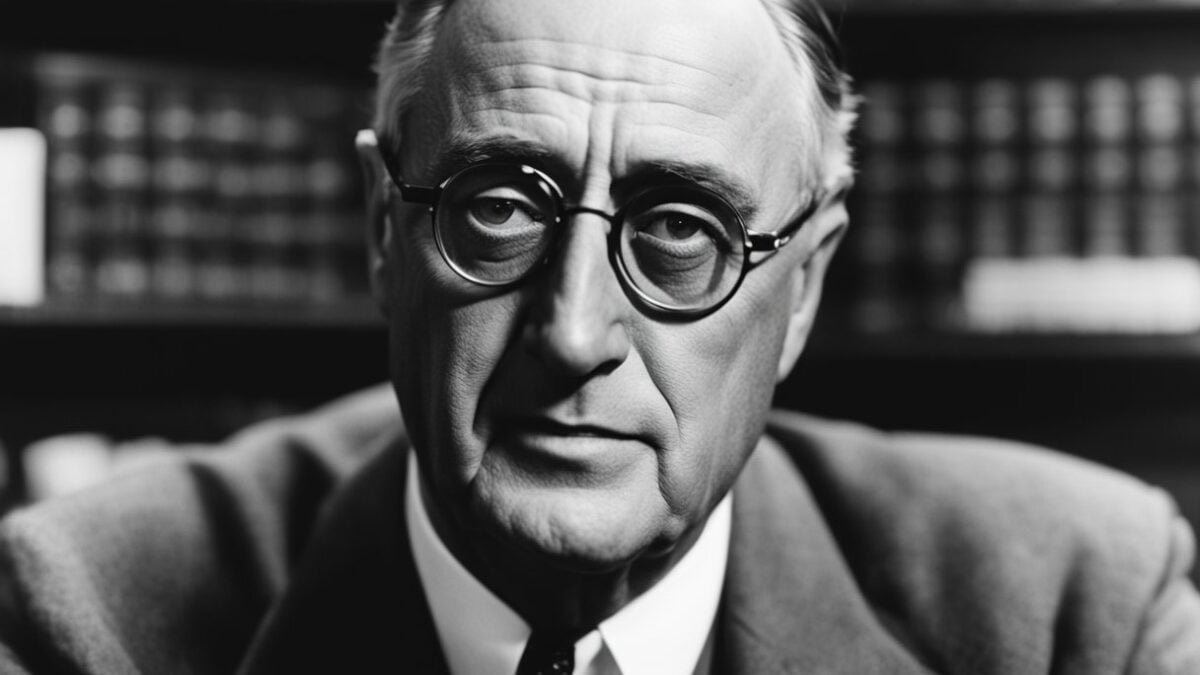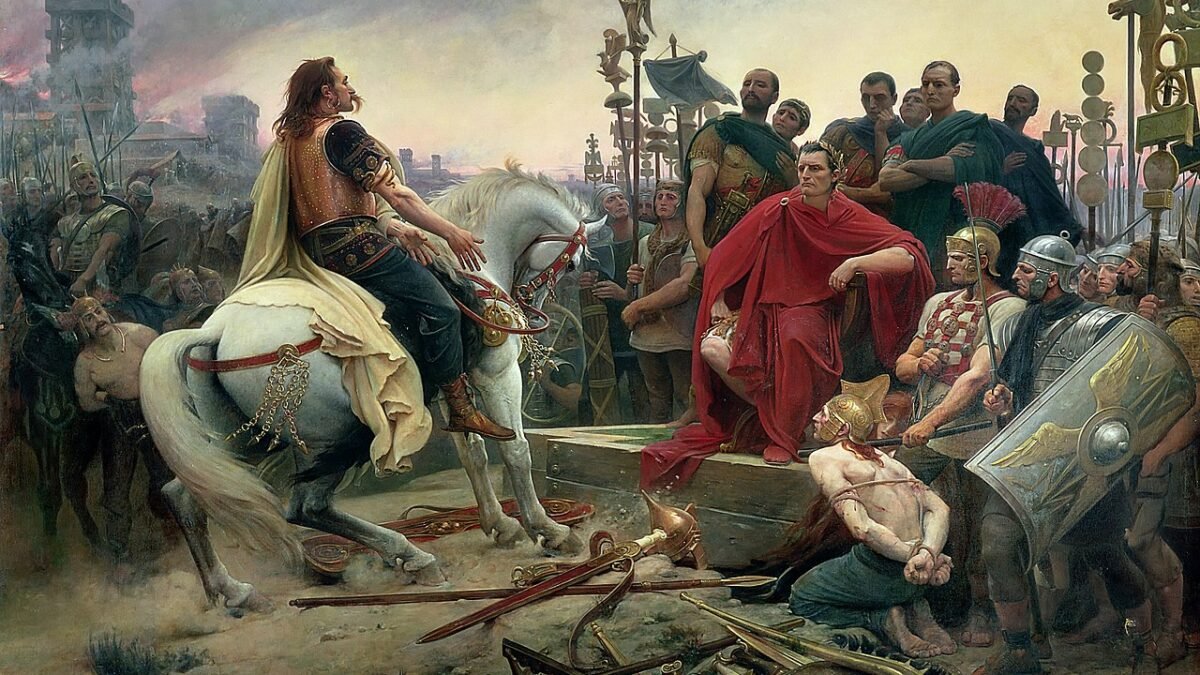Alexander the Great, also known as Alexander III of Macedon, was one of the most brilliant and ambitious leaders in history. His legacy as a conqueror, strategist, and visionary influenced the ancient world and shaped the course of history.
Also check out: Julius Caesar: Roman General and Politician
Childhood and Education of Alexander the Great
Alexander the Great was born in 356 BC in Pella, Macedonia, the son of Philip II and Olympias. His education and upbringing played a crucial role in shaping the man who would become one of history’s greatest conquerors.

Childhood and Education
From an early age, Alexander was exposed to rich cultural and educational environments. Despite family tensions, he received a broad and diverse education. The presence of Aristotle in his life was particularly influential. The philosopher, one of history’s great thinkers, became his tutor at the age of 13. Over the next three years, Aristotle taught him history, philosophy, ethics, politics, mathematics, medicine, and literature. Aristotle’s philosophy influenced Alexander’s worldview and values, shaping his understanding of power, leadership, and ethics.
Military Instruction and Paternal Influences
At the same time, the military influence of his father, Philip II, was crucial. Philip was a brilliant strategist who transformed the Macedonian army into a powerful force. Alexander observed his father’s campaigns and strategies, absorbing high-level military knowledge from a young age. He excelled in handling weapons and military command, skills that would reflect in his own campaigns and war tactics.
Development of Character and Personality
The education and influences that shaped his youth were pivotal in forming his character. He grew up in an environment of ambition and power, where intellectual education combined with military instruction. This diverse and rich environment shaped a young man who possessed both wisdom and knowledge as well as courage and determination.
Ascension to the Throne and Expansion of Alexander the Great’s Empire
After his father, Philip II’s death in 336 BC, Alexander, at only 20 years old, ascended to the throne of Macedonia, a transition that challenged not only his youth but also his legitimacy as an heir.
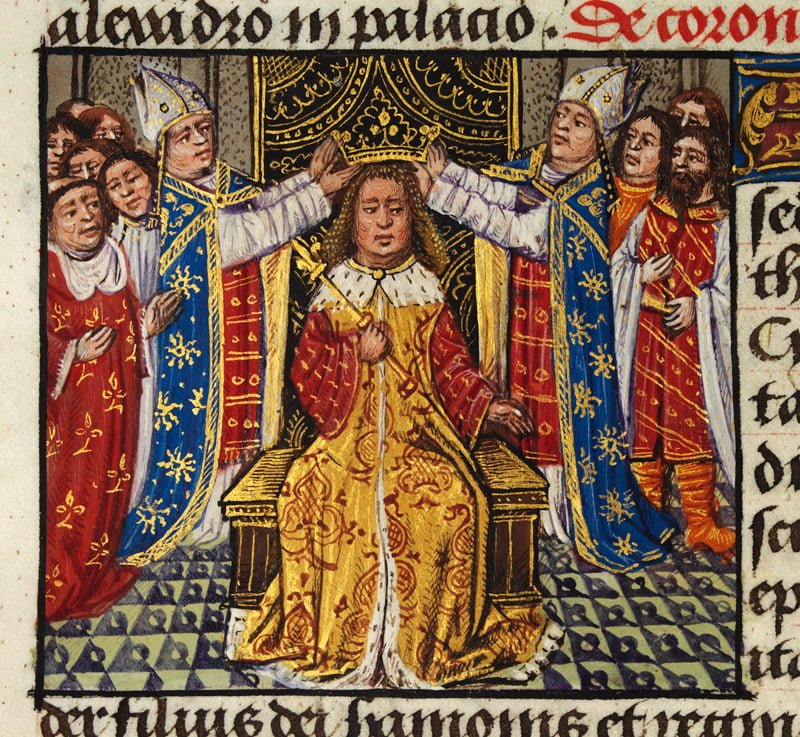
Alexander the Great’s Ascension to the Macedonian Throne
Alexander’s succession to the throne was contested by various generals and nobles, resulting in revolts and challenges to his newly acquired authority. However, he quickly demonstrated his leadership ability, suppressing revolts and consolidating his position as king.
Continuation of Philip II’s Conquests
With his father’s death, he inherited a powerful and well-organized kingdom. He continued the legacy of Philip II by implementing administrative and military reforms. These reforms strengthened the Macedonian army and solidified control over the empire.
Commencement of Conquests
Alexander began his campaign of conquests by suppressing rebellions in Greece. After consolidating his rule in the Greek peninsula, he turned his sights to the Persian Empire, seeking to avenge Persian invasions of Greece and extend his own empire.
Military Campaign of Alexander the Great in the East
The military campaign, known for its speed, audacity, and efficiency, was marked by decisive victories in battles, including the Battle of Granicus, the Battle of Issus, and the Battle of Gaugamela. His innovative tactics and courageous leadership ensured victories even against numerically superior opponents.
The conquests extended beyond the Persian Empire, reaching Egypt and India. He founded cities wherever he went, including the famous Alexandria, creating a network of cultural exchange and knowledge that shaped the ancient world.
Military Strategy and Charismatic Leadership of Alexander the Great
Military capability combined with his charismatic leadership was fundamental to his conquests and the creation of a vast empire that stretched from the Mediterranean to India.
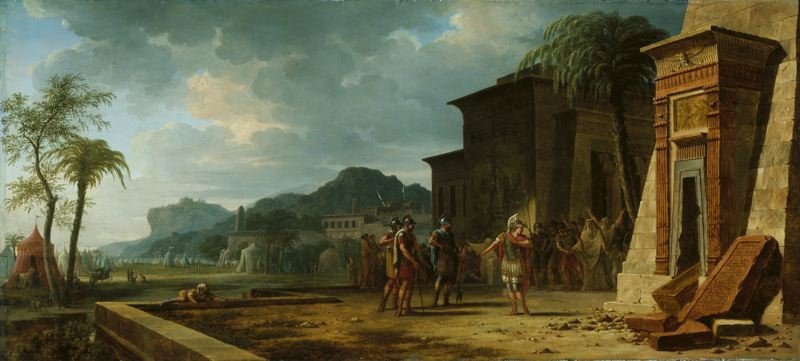
Innovative Strategies
Alexander introduced innovative military strategies that became his hallmark. He utilized speed and mobility as key tactics, moving swiftly to surprise and destabilize his opponents. His heavy infantry combined with agile cavalry and the Macedonian phalanx formation became an unbeatable force.
Battle Strategy of Alexander the Great
In battles, he often personally led his troops, displaying courage and inspiring his soldiers. His “wedge” tactic involved a frontal attack, leading the charge with his elite troops to break the enemy lines.
Tactical Flexibility
One of his main qualities was his ability to adapt to terrain and the enemy’s tactics. He often modified his strategies based on the situation and the terrain, enabling him to successfully face a variety of military challenges.
Charisma and Leadership
Charisma was one of his greatest weapons. He established a personal bond with his soldiers, sharing victories and hardships, which strengthened their loyalty and commitment. His inspiring presence on the battlefield and his willingness to risk his own life in leading attacks boosted his troops’ confidence.
Respect for Other Cultures
Despite his military conquests, he displayed remarkable respect for the cultures and traditions of the people he conquered. He often adopted local practices and, in many cases, incorporated local leaders into his administration, ensuring a degree of cultural continuity and governance.
Legacy and Cultural Contributions of Alexander the Great
Alexander’s legacy goes beyond his military conquests. His influence extended to culture, knowledge, and the exchange between people from different regions.
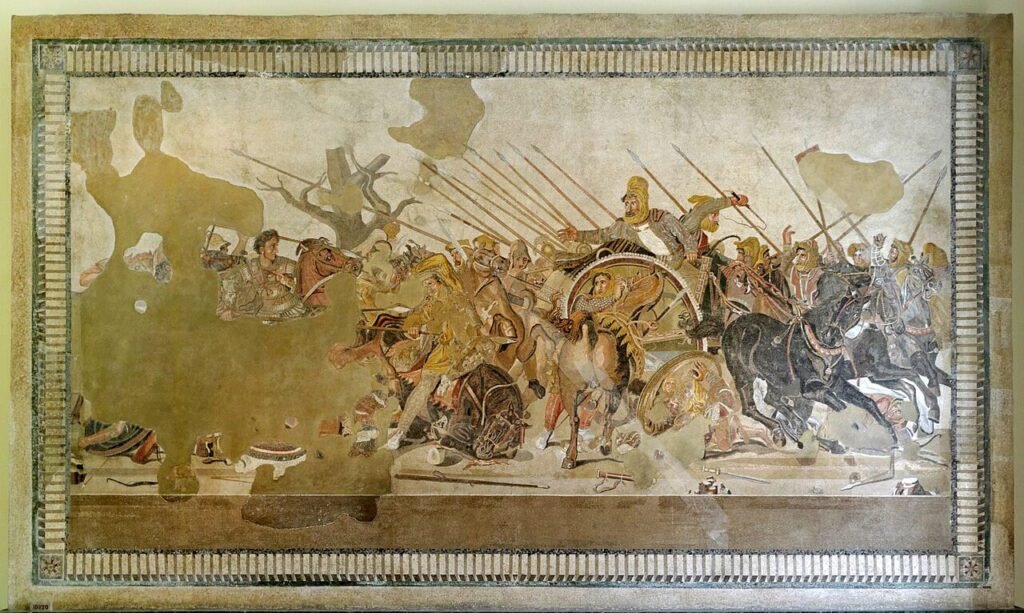
Cultural Exchange
One of his greatest contributions was the dissemination of Greek culture throughout his empire. He founded cities that became centers of Greek culture, stimulating interaction between different cultural traditions. These cities became hubs of cultural and intellectual exchange.
Foundation of Alexandria
One of the most famous cities he founded was Alexandria in Egypt. This city became a center of knowledge, housing the legendary Library of Alexandria, which contained vast collections of literary, scientific, and philosophical works, significantly contributing to the preservation and propagation of ancient knowledge.
Synthesis of Cultures
The empire facilitated the fusion of different traditions and cultures. This led to a rich cultural syncretism, where practices and ideas from various regions intertwined, resulting in a period of intellectual and artistic effervescence.
Advancements in Architecture and Urban Planning
The cities founded reflected architectural, urban, and technological advancements. Many of these cities were built following Greek architectural patterns, incorporating theaters, amphitheaters, sewage systems, and aqueducts, leaving a lasting legacy in architecture.
Spread of the Greek Language
The use of the Greek language as the lingua franca of the empire enabled communication between different peoples and facilitated cultural and intellectual exchange. This contributed to the spread of Greek ideas, knowledge, and values.
Influence on the Ancient World and Beyond
Alexander’s legacy influenced not only the ancient world but also later civilizations. His empire was a catalyst for the fusion of cultures and knowledge, establishing a foundation for synergy between Eastern and Western traditions.
Alexander the Great’s Journey to the East and His Conquests
The legendary journey to the East, an 11-year expedition, was marked by a series of military campaigns, expanding the boundaries of the known world at that time.
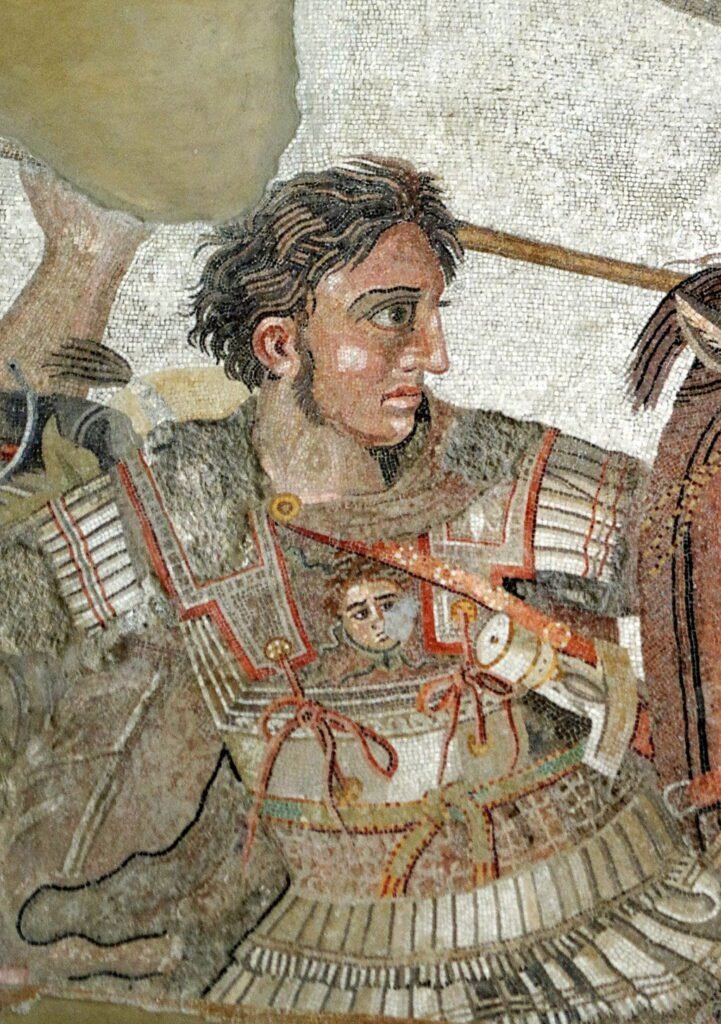
Commencement of Alexander the Great’s Conquests
The expansion of the empire began soon after his ascent to the Macedonian throne, with the aim of avenging Persian invasions in Greece and extending his own empire. The strategy was to advance eastward, confronting the Persian Empire.
Battle of Granicus and Conquest of Asia Minor
The first major battle was at Granicus, where he faced the Persian army. His victory marked the beginning of the conquest of Asia Minor, followed by the submission of several cities and kingdoms. His policy of clemency toward cities that surrendered made him popular among the conquered peoples.
Battle of Issus and Dominance of Syria
The Battle of Issus was another crucial victory for Alexander. He defeated the Persian king Darius III and captured Persian territories in Syria, thus expanding his domain. After the battle, many Syrian cities voluntarily surrendered.
Battle of Gaugamela and the Fall of the Persian Empire
The Battle of Gaugamela, one of the most famous, was where Alexander faced Darius III and secured a decisive victory, conquering Persia and putting an end to the Persian Empire. Darius fled, being later assassinated.
Expansion into Egypt and Foundation of Alexandria
After Gaugamela, he advanced into Egypt, where he was received as a liberator. He founded the city of Alexandria, which became a center of culture and knowledge, promoting cultural and intellectual exchange.
Advancement into India and the Retreat
The campaign into India was challenging. Alexander faced resistance from local kingdoms and battled in the region of the Indus River. However, after a series of battles, his exhausted troops convinced him to return.
Death and Legacy of Alexander the Great
His premature death in 323 BC at the age of 32 marked the end of a period of remarkable conquests and left a power vacuum that triggered significant events in history.
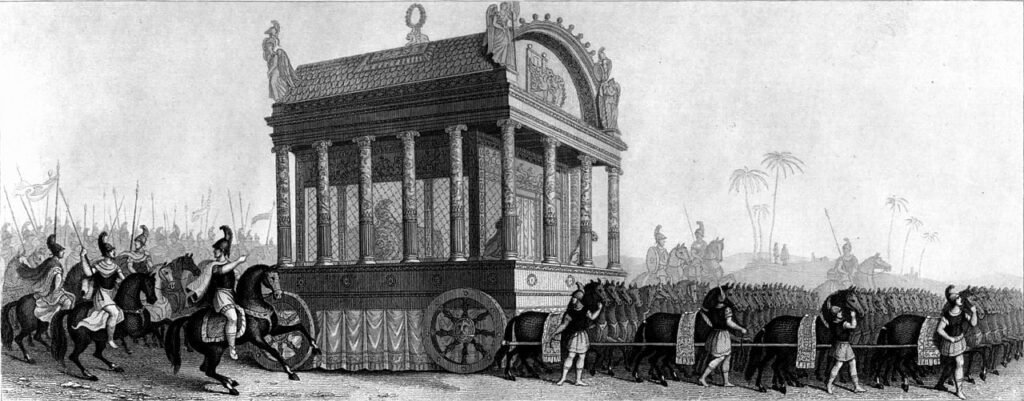
Circumstances of Alexander the Great’s Death
The exact cause of his death is a subject of debate among historians. Some theories suggest poisoning, malaria, typhoid fever, or even trauma resulting from battle injuries. His sudden death triggered a succession crisis in his vast empire.
Succession Crisis
His death left behind a vast and complex empire without a clear heir. This resulted in disputes among his generals and officials, known as Diadochi, about who should succeed and rule the different regions.
The empire was divided among his generals into four major kingdoms after a period of war and alliances. The Ptolemaic Kingdom ruled Egypt, the Seleucid Kingdom ruled Mesopotamia and Persia, the Kingdom of Macedonia controlled Greece, and the Kingdom of Thrace governed parts of Asia Minor.
Legacy and Enduring Impact
The legacy was immense and long-lasting. His conquests expanded the boundaries of the known world and promoted interaction between different cultures, stimulating cultural exchange and intellectual development.
Hellenism and Cultural Exchange
The period after his death, known as the Hellenistic period, witnessed the spread of Greek culture and significant cultural exchange between the East and the West. This included the sharing of knowledge, cultural practices, and philosophy, resulting in cultural syncretism across vast regions.
Legacy in Alexander the Great’s History
Alexander’s impact on history is undeniable. His conquests shaped the ancient world and influenced later civilizations. His legacy was fundamental in understanding the cultural exchange between civilizations and in the spread of Greek knowledge and values across different regions.
